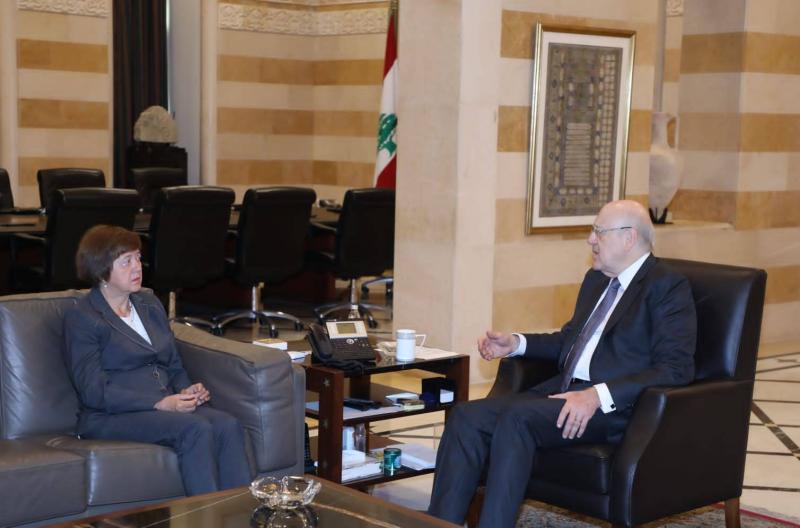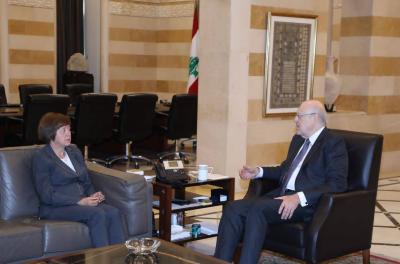Lebanon's caretaker Prime Minister Najib Mikati met today, Wednesday, with the United Nations Special Coordinator for Lebanon, Joanna Wronecka, to discuss his upcoming visit to New York and his meeting with UN Secretary-General António Guterres. They touched upon the issue of the presidency, discussions with the International Monetary Fund, and the government's operations.
**Amendment of the Monetary Law**
Prime Minister Mikati chaired a meeting of the “Committee tasked with proposing amendments to the Monetary and Credit Law,” which included former Minister Ibrahim Najjar and members: Ghassan Ayyash, Hassan Saleh, Nasri Diab, Abdel Hafiz Mansour, Judge Rana Akkoum, the Director General of the Ministry of Finance George Mraoui, and former Minister Nicolas Nahas, an advisor to Mikati. The committee updated Mikati on the outcomes of their discussions.
**Lebanon Medical Association**
Mikati also received the head of the Lebanese Medical Association, Youssef Bakhach, who led a delegation from the medical and health unions. They discussed the various challenges facing the sector. Bakhach announced after the meeting that "the main objective of our visit is to inform Prime Minister Mikati about the vision we have envisioned for years. We are suffering from a number of issues regarding the shortage of medications and the operational costs of hospitals, but today, if we want to look at the reality, there is an adaptation from the private sector to this situation, amidst a stagnation from the state and its institutions. This adjustment could be unsound, but we must build on this phase to organize the health sector in Lebanon. Therefore, we as health unions decided to organize our work, by emphasizing the role and importance of medical tourism as it provides job opportunities for many sectors. Medical tourism has existed in Lebanon for decades but without organization, as seen in Turkey, Jordan, Egypt, and Dubai, which have advanced significantly in this area." He noted that "the positive thing is that despite around twenty-five percent of doctors emigrating, twenty percent of them have returned to Lebanon. Despite the challenges faced by Lebanese citizens regarding hospital bills in the absence of state health insurance funds, Lebanon’s hospitals and doctors provide the highest quality medical care and surgical services to citizens. Therefore, it is our duty to show the true picture of Lebanon, supporting the state in its gradual recovery."
**Matar**
Mikati and MP Ihab Matar discussed the issue of students in public schools, where the Prime Minister showed full cooperation. Following communication with Minister of Education Abbas Halabi, it was agreed that the minister would issue a circular instructing directors in all public schools to accept all student applications, regardless of payment status, to ensure no student is left out of the academic year. Matar indicated that "parents will submit applications to the school directors, and the financial situation of each student will be considered individually; those unable to pay fees will have their cases reviewed for exemptions, reductions, or installment plans. Both Prime Minister Mikati and Minister Halabi expressed their commitment to ensuring no student remains outside of school, and I thank them for their efforts."
**Austrian Ambassador**
Mikati welcomed the Austrian Ambassador to Lebanon, Rene Emmerich, during which they discussed general conditions and bilateral relations between the two countries.
**Greek Ambassador**
Mikati also met with the Greek Ambassador to Lebanon, Catherine Fontoulaki, in a farewell visit.
**Khoury**
Additionally, he welcomed the Secretary-General of the Lebanese-Syrian Higher Council, Nasri Khoury.




